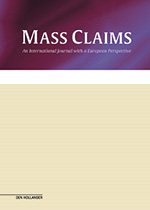Residue Funding:
Stien Dethier1Re-allocating Excess Funds to Fund New Class Actions
This article introduces and analyses residue funding, a funding method for class actions that allocates the possible residue awarded after winning the case to the original funder. Residue funding can be designed in two different models: an obligatory self-financing system or a return-on-investment system, through different funders. While some negative side effects of the proposed funding method would require additional attention, the smart allocation of excess funds through residue funding and its potential to be combined with other funding methods advocate for a further legal analysis.
1. Problem Statement
1.1. Lack of Funding...
The lack of funding for class actions has been an issue across the EU for a while, and does not seem to have been resolved with the newest Representative Actions Directive (hereinafter: "RAD").2 The RAD exp...
U heeft op dit moment geen toegang tot de volledige inhoud van dit product. U kunt alleen de inleiding en hoofdstukindeling lezen.
Wanneer u volledige toegang wenst tot alle informatie kunt u zich abonneren of inloggen als abonnee.


